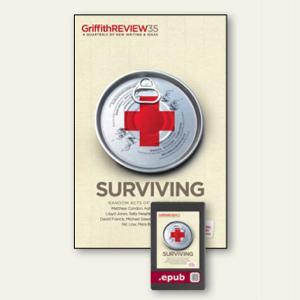“‘Surviving’ explores tales of extraordinary battles and random brushes with fate, and presents hard-won lessons on how to be better prepared, and adopt, survive and even thrive after disaster.”
Disasters come in all shapes, all sizes, all scales, and this, first quarterly issue of Griffith REVIEW for 2012 serves to highlight how the inexplicable twists of fate, the loss and pain wrought by man and nature, can happen to anyone; and how much they hurt. Behind every statistic, coronial inquest, management plan, humanitarian effort there are parents who have lost a child, families that have been ripped apart and lives shattered. And there are some who’ve survived. It’s sobering stuff.
Having put together this astounding collection of Australian writing, editor Julianne Schultz reflects in her introduction on the spate of natural disasters experienced in 2011, and the apparent increasing frequency and severity of climatic events around the world. Disasters can be predicted and societies need to find ways to expect, prepare and mange them.
The memoirs, essays, reporting, short stories and poems presented provide insights into the many different approaches and responses people have to tragic events.
The writing is as varied in style as the events they respond to; from Colin Mills lean prose in Ghost town, that feels as though we could touch the wreckage of Japan’s tsunami, Tom Bamforth’s passionate and maddening memoir of the international response to Pakistan’s earthquakes in How to survive an earthquake, to Geoff Page’s poem Auntie May, 1953, which so touchingly reminds us of the unseen scars terrible deeds leave on those who survive. These works placed side by side create a rich and reflective landscape.
Opening this edition, in Flooding plains, bursting rivers, human suffering Matthew Condon traces the approach of the La Niña that caused the 2010-11 Queensland floods and their political and human cost. It seems we never believe disaster is truly looming. The same sad tale is played out in Sally Neighbour’s Life and death on the high seas as she charts the destruction of the Janga onto the rocks of Christmas Island in December 2010 and the subsequent death of approximately 50 asylum seekers and the brave rescuing of another 42. A lack of preparation, of appropriate resourcing, coordination and of realisation that ‘this’ is urgent, seems to unfold again and again.
As Tom Griffiths observes in The language of catastrophe: “The history of bushfire is full of shocking recurrence – and of recurrent shock.” Not only do people seem unable to understand that disaster will occur, they fail to believe it will recur too. The Black Saturday Royal Commission brought home to many the failure of managerial language to warn people and express what was happening. Griffiths argues we have to find words; we have to find new expressions and embrace the literature that disaster inspires if we are to stop repeating the same mistakes.
But how do we balance the need to reflect and learn from catastrophe with the desire to start over and rebuild as quickly as possible? Disasters can provide the opportunity for something more resilient to grow, argues Mara Bun, when communities come together to re-make themselves in environmentally sustainable ways. In Nic Low’s personal account of the effect of the 2011 earthquakes on Christchurch, he reflects on how a conservative identity and history have crumbled with the stonework, and hopes a new outlook may yet emerge in the city’s reconstruction.
We are also reminded that disasters can be of human making, such as the economic woos facing Greece in Jorge Sotirios’s essay Europe’s Trojan horse and the intergenerational destruction shaped by child abuse, as on Pitcairn Island in When bystanders fail by Kathy Marks. And the media’s role in telling the story of tragedy, particularly of the victims, forced into the spotlight when they are at their most vulnerable, is explored in Informed consent by Michael Gawenda.
There are also contributions from Sophie Cunningham, Lee Kofman, Ashley Hay, David Fancis, Sydney Smith, Virginia Peters, Nikola Gurovic, Lloyd Jones, Lisa Gorton, Maria Takolander and images by Dean Saffron.
The last word on this subject however, is struck deep to the heart by Sidney Dekker’s beautiful and devastatingly sad essay, The meaning of a disaster. Can there ever be rhyme or reason, sense found, in the inexplicable randomness of who is spared and who is lost? Because for those left behind, the path can never be the same again.
Rating: 4 1/2 out of 5
GriffithREVIEW
Surviving
Edition 35
Autumn 2012
RRP $27.95
Text Publishing
Book Release: 6 February
http://www.griffithreview.com





